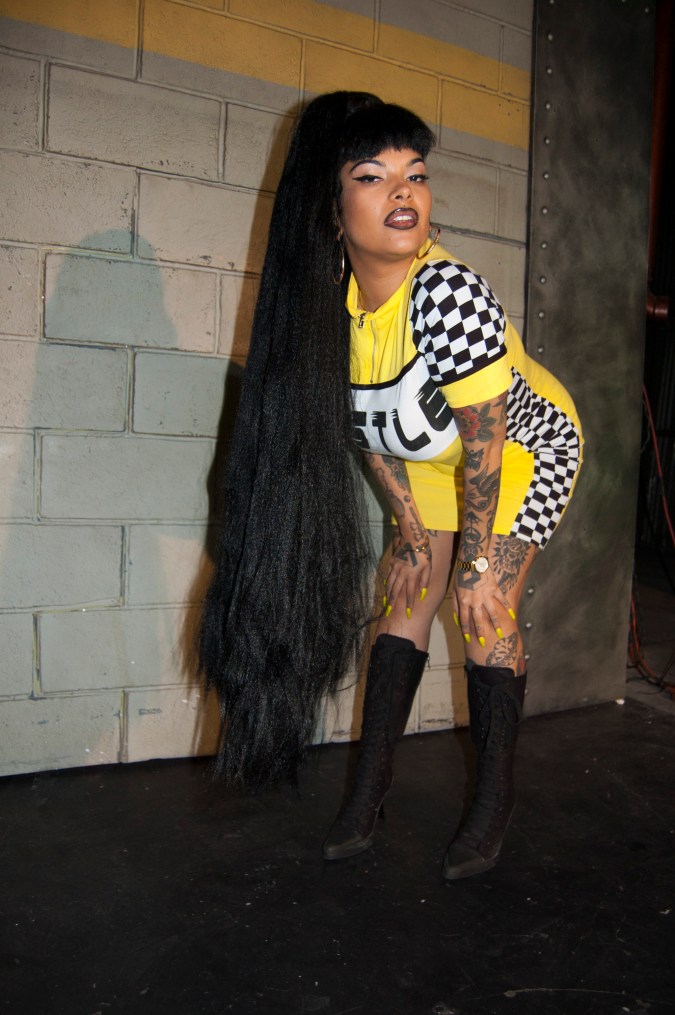Now that she has a record deal and a new album made with legendary producers in a well-equipped studio, it’s easy to forget that Tomasa del Real gave birth to her reggaeton career in her apartment in Iquique, a small town where the plateaus of Southern Peru meet the Chilean coastline in a flurry of high-rise buildings and highways. It was there, in 2014, that she made her music video for “La Vampira.” Tomasa used a simple mirroring trick in the clip so that her purple lips and impressively long locks flit in and out of the shot, hypnotic as the undead being with whom she claims allegiance in the song’s lyrics. An unidentified friend shows up in the background at one point. Tomasa didn’t even edit out the part at the end where she turns the camera off; DIY and proud.
Compare the video with the effect-heavy clip for her latest single “Barre Con El Pelo.” Back up dancers bounce down into the splits in a chromed-out, club-lit auto showroom. Tomasa has hair to mid-thigh and everyone’s styled by Freak City. The only thing that remains from the “La Vampira” days is Tomy’s aself-assured intonations and that indefatigable confidence.

The woman has never lacked moxie. “La Vampira” and a string of similarly lo-fi smartphone videos helped her build a network among the young Latinx club producers of the world, who, like her, had grown up with reggaeton and dancehall rhythms and were morphing them, reflecting the internet culture that had helped lead them to the genres in the first place. Later, during an online radio broadcast, Tomasa would find occasion to dub these audio journeys “neoperreo,” labeling not just her own music (her definition of the term: “danceable, Latino, new”) but also a generation of independent artists who readily adopted the word.
For a more fleshed-out vision of what neoperreo can mean, one can now turn to Tomasa’s first album since signing with Nacional Records, Bellaca del Año. Her auto-tuned voice slides over party-ready perreo, clean but aggressive reggaeton lyrics that, for a change, put the men in the role as the observed, the pursued. Beats are more lush, especially compared with the bare bones rhythm structures Tomasa built for her early songs.

Skyping with Remezcla a week before Bellaca del Año was set to drop, Tomasa says it doesn’t bother her that everyone from promoters in San Francisco to producers in New York have used her descriptor, as long as they know their place. “People are using ‘neoperreo’ to refer to a genre, which I think is great, the best!” she says. “It helps my brand grow.” She laughs, then gets serious. Not for nothing did she lock down the legal rights to the word in Mexico last year. “But I think it can get misinterpreted — and it has already happened.”
You see, Tomasa has plans for Neoperreo as a proper noun, which she sees as a separate, if parallel project to her solo career. She plans to use the label as a vehicle for promoting artists that like her, hail from places far from the traditional centers of the music industry. The singer never had the privilege of being a “local” artist, not even on her trips from Iquique to perform in Santiago. Perhaps that’s why she feels obliged to bring her peers along for the ride now that she’s on the rise. Neoperreo will be releasing singles and videos from emerging artists and in July and playing a Latin Alternative Music Conference showcase in New York. The lineup will also feature her Chilean crew; rappers Ricci Motora and Jamez Manuel, along with RIP TXNY, Tomasa’s boyfriend, who works as her tour DJ and pulled down a producer credit for Bellaca del Año song “Toto.”

Given the intense rise in global popularity of reggaeton and Tomasa’s business acumen, the group seems well-positioned. And she’s not worried about her vision being diluted now that she’s gained industry support and is collaborating with such producers as DJ Blass (a Puerto Rican pioneer of the genre who is finding new life in the neoperreo generation), Toy Selectah, and BrunOG. On the contrary. “I have more control, because I have control over it sounding better,” she says. “I’m a daughter of the underground, but I don’t want to be playing in bars forever. I have more control now over bringing my career to another level, more advanced. That’s what I want.”
Tomasa del Real’s Bella del Año is out now on Nacional Records.




